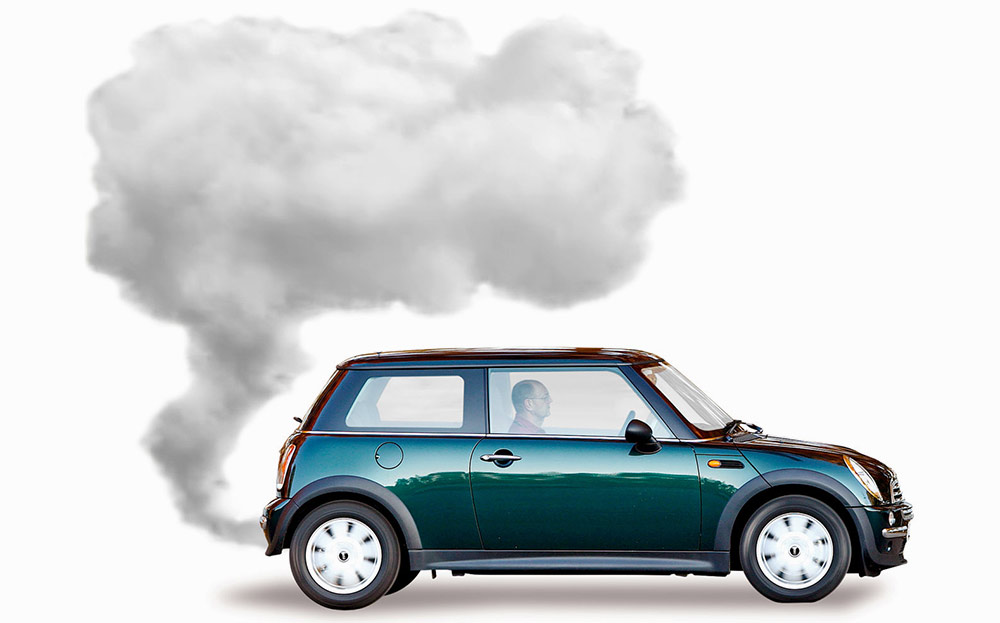Gone in a puff of smoke: UK spot checks on car emissions axed
Decision to end roadside testing "deeply disturbing"
A CLOUD of grey-brown exhaust as a diesel car accelerates, an old car blowing blue oil smoke — sights like these are all too common on Britain’s roads. Angry motorists fondly imagine their drivers will be waved into a nearby roadside checkpoint crawling with government inspectors. The officials will attach emissions-measuring equipment to the exhaust pipes of the miscreants’ cars, and within seconds the selfish drivers will be slapped with a penalty notice or, more justly, have their cars impounded.
Dream on. Amid mounting controversy over exhaust fumes, it has emerged that the government has cancelled funding for checks on dirty vehicles that provided the first and arguably most effective line of defence. “Funding from government [for police and local authortities to carry out roadside checks] dried up. It’s very limited these days.
The Department for Transport (DfT) has revealed that it stopped checking cars’ exhaust emissions five years ago. Now only the annual MoT test stands between clean air and cars covering thousands of miles belching toxic smoke.
Browse NEW or USED cars for sale on driving.co.uk
Today, cameras monitor your speed, record your numberplate and catch you if you enter a bus lane, but if you want to fill the air with poisonous fumes, go ahead.
True, the DfT testing programme was not about enforcement. Its aim was simply to check that the emissions systems of cars were performing as designed. It used inspectors from the government’s Vehicle Certification Agency, which is responsible for approving new vehicles for use. They singled out specific models of car, examining up to 20 of each type between 2001 and 2011. Any that failed were tested two further times.
Over 10 years just two models were deemed to have failed (the Mitsubishi Carisma petrol and BMW Mini One D), a figure at odds with what our own eyes tell us — that many cars belch fumes.
According to the DfT, the test programme’s low failure rate was a key factor in the decision to end it in 2011. Louise Ellman, who chairs the Commons transport select committee, which is investigating emissions in the wake of the Volkswagen scandal, says its decision is “deeply disturbing”.
“Manufacturers inform the VCA and other agencies only when a model has failed self-testing. The DfT was unable to tell The Sunday Times how many cars had failed”
“I will be pursuing both the VCA and the Department for Transport on how this happened when they appear in front of the committee as part of our ongoing inquiry,” she said.
Although the government has ceased to test car exhausts, car makers continue to do so, as required by European law. This so-called “in-service” testing involves examining batches of cars at various ages and mileages. However, this is not transparent. It is policed by manufacturers, who inform the VCA and other agencies only when a model has failed. The DfT was unable to tell The Sunday Times how many cars had failed. The Society of Motor Manufacturers & Traders, which represents car makers, said it was not privy to the data.
Meanwhile, having stopped its general testing programme, the DfT diverted its resources to testing the effects of aftermarket alterations on cars’ emissions systems. Of special concern was a growing trend among motorists for removing their car’s diesel particulate filter. Exhaust particulates are a big health hazard. The filters are there to stop particulates being emitted but they can become clogged.
Browse NEW or USED cars for sale on driving.co.uk
Some groups of professional drivers (delivery and minicab firms) routinely remove the filters to cut running costs. The practice became so common that there was a scale of charges for the service at many backstreet garages. Changes to the MoT test were introduced in February 2014 and last year 300,000 of the 28m cars tested were failed for fuel and exhaust defects. Yet even the tightening up of the test will not cure the problem without the roadside checks being brought back in, critics say.
Drivers will continue to pollute unless they face prosecution. For some, it makes financial sense to buy a clapped-out vehicle that has just scraped through its MoT, run it for a year — during which time further deterioration causes more noxious fumes — then abandon it before it is due for another test.
“The DfT should stop doing lab testing and move over to a portable emissions-measurement system that allows measurement of a vehicle’s emissions as it is being driven,” said James Tate, a scientist at the Institute for Transport Studies.
As yet another diesel car passes trailing a cloud of smoke, it’s a view that drivers are increasingly likely to agree with.





